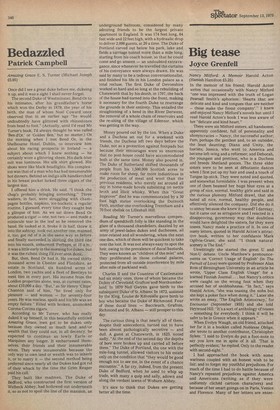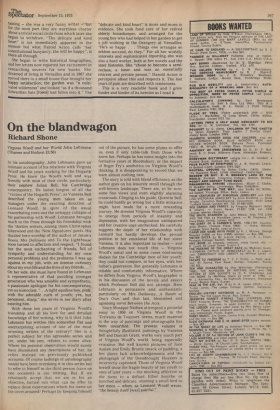Big tease
Joyce Grenfell
Nancy Mitford: A Memoir Harold Acton (Hamish Hamilton £5.25) In the memoir of his friend, Harold Acton writes that occasionally with Nancy Mitford "one was impressed with the truth of Logan Pearsall Smith's aphorism: 'Hearts ttrat are delicate and kind and tongues that are neither — these make the finest company'." I knew and enjoyed Nancy Mitford's novels but until I read Harold Acton's book I was less aware of her "delicate and kind heart."
There were six Mitford sisters, all handsome, apparently confident, full of personality and idiosyncracies — Nancy, the successful author; Pam, perhaps the gentlest and, to an outsider, the least daunting; Diana and Unity, the fascists; Jessica, who went to America and became left-wing and a reformer; and Deborah, the youngest and prettiest, who is a Duchess and breeds Shetland ponies. The three elder sisters were to be seen at debutante dances when I first put up my hair and used a touch of Tangee lip-stick. They were noted and quoted, and somewhat formidable. I was present when one of them beamed her huge blue eyes at a group of nice, normal, healthy girls and said in the curious plummy Mitford drawl, that she hated all nice, normal, healthy people, and effectively silenced the company. Did she do it to annoy because she knew it teased? I daresay; but it came out as arrogance and I reacted in a disapproving, governessy way that doubtless would have delighted the sisters, for they were teases. Nancy made a practice of it. In one of many letters, quoted in Harold Acton's attractive book, written to her confidante Mark Ogilvie-Grant, she said: "I think natural scenery is The End."
Unwittingly she started the great U and Non-U debate. Uncle Matthew's pronouncements on 'Correct Usage of English' (in The Pursuit of Love) were quoted by Professor Alan Ross of Birmingham University in an article he wrote, 'Upper Class English Usage' for a learned Finnish Journal .. . but Nancy's critics were caught on the wrong foot when they accused her of snobbishness. "In fact," says Harold Acton, "she was teasing the nobs but she kept a poker face when doing it." Later she wrote an essay, 'The English Aristocracy,' for Encounter (September 1955) and she told Heywood Hill: "It's a sort of anthology of teases — something for everybody. I think it will be safer to be in Greece when it appears."
When Evelyn Waugh, an old friend, attacked her for it in a booklet called Noblesse Oblige, she wrote to another contributor, Christopher Sykes: "I said to Evelyn do put a foot-note. to say you love me in spite of it all. 'That is perfectly evident,' he replied. Only to the reader with second-sight."
I had approached the book with some wariness coupled with an honest wish to be fair; and to forget my youthful prejudices. For much of the time I had to do battle because of Nancy's repeated prejudices against America and Americans (writing as if they were uniformly cliched cartoon characters) and because of her smart goings on in Paris, Venice and Florence. Many of her letters are enter taming she was a very funny writer -' but for the most part they are worthless chatter about a trivial social circle from which later she began to withdraw. "The delicate and kind heart" is not immediately apparent in the memoir but what Harold Acton calls "her Constitutional buoyancy, the will be happy", is there all through.
She began to write historical biographies, and her letters now reported her excitement in researching sources for new books. She dreamed of living in Versailles and in 1967 she moved there to a small house that brought her happy satisfaction; the garden was "a cultivated wilderness" and looked "as if a thousand Edwardian hats [roses] had fallen into it." The "delicate and kind heart" is more and more in evidence. She took fond care of her retired elderly housekeeper, and arranged for the young boy who had helped in her garden to get a job working in the Orangery at Versailles. "He's so happy . . . Things one arranges so seldom succeed, do they." For all her worldly interests and sophisticated reporting she was also a hard worker, both at her novels and the later histories. She "chose to become a semirecluse, a loner and was an essentially reticent and private person." Harold Acton is perceptive about this and respects it. The last years of pain are described with tenderness.
This is a very readable book and I grew fonder and fonder of its heroine as I read it.



































 Previous page
Previous page